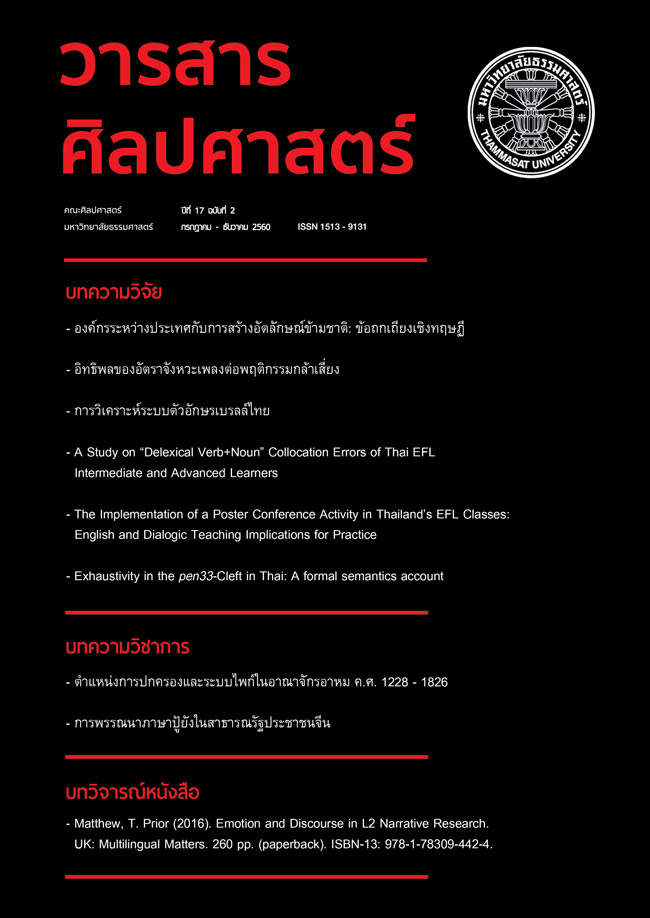Theoretical Debates on a Transnational Organization and Transnational Identity Construction
Main Article Content
Abstract
This study investigates some theoretical debates on how a transnational organization could possess specific characteristics, instrumentalized for transnational identity construction; and whether transnational and national identities can coexist or remain competitors for popular allegiance.
Scholarly interest in the topic is a result of the European Union’s identity promotion projects particularly since the 1992 European Union Treaty. The EU is used as a case study. The diversity of approaches reflects the diverse scholarly backgrounds. The conclusion of the article notes that scholars have different interpretations on the topic. The nationalist theorists, on the one hand, argue that transnational organizations do not possess most features necessary for identity construction. Other scholars, on the other hand, suggest that the study of transnational identity should not and cannot employ nationalist approaches. Furthermore European identity can be conceived in civic terms, in so far as such a project is based on legal and political rights.
Downloads
Article Details

This work is licensed under a Creative Commons Attribution-NonCommercial-NoDerivatives 4.0 International License.
References
Anthony D. Smith. (1986). Ethnic Origins of Nation. Oxford: Blackwell Publishing.
Benedict Anderson. (1983). Imagined Communities: Reflections on the Origin andSpread of Nationalism. London: Verso.
Bruter, M. (2005). Citizens of Europe?: The emergence of a mass European identity. Basingstoke and New York: Palgrave Macmillan.
Carey, S. (2002). Undivided loyalties. Is national identity an obstacle to European integration?. European Journal of International Relations, 7, 139-174.
Chhristin, J. (2008). Reasonable Europeans: Determinants of citizens’ support for the delegation of competencies in 29 countries. Baden-Baden: Nemos.
Ernest Gellner. (1983). Nations and Nationalism. Ithaca: Cornell University Press.
Hooghe, L. & Marks, G. (2005). Calculation, Community and Cues: Public Opinion on European Integration. European Union Politics, 6(4), 419-443.
John Hutchinson & Anthony D. Smith. eds. (1994). Nationalism. Oxford: Oxford University Press.
Karl Deutsch. (1953). Nationalism and Social Communication: an inquiry into the foundations of nationality. London: Chapman & Hall.
McLaren, L. (2004). Opposition to European integration and fear of loss of national identity: debunking a basic assumption regarding hostility to the integration project. European Journal of Political Research, 43(6), 895-911.
Neil Fligstein. (2008). Euroclash: The EU, European Indentity, and the Future of Europe. Oxford: Oxford University Press.
Philip Spencer & Howard Wollman. eds. (2005). Nations and Nationalism: A Reader. Edinburgh: Edinburgh University Press.
Rawi Abdelal, Yoshiko M. Herrera, Alastair Iain Johnston & Rose McDermott. eds. (2009). Measuring Identity: A Guide for Social Scientists. Cambridge: Cambridge University Press.
Rebecca Friedman & Markus Thiel. eds. (2012). European Identity andculture: Narratives of Transnational Belonging. Surrey: Ashgate Publishing Company.
Richard K. Herrmann, Thomas Risse & Marilynn B. Brewer. eds. (2004).Transnational Identities: Becoming European in the EU. Lanham, MD: Rowman & Littlefield.
Rodolfo C. Severino. (2006). Southeast Asia in Search of An ASEAN Community. Singapore: Institute of Southeast Asian Studies.
Sonia Lucarelli, Furio Cerutti & Vivien A. Schmidt. eds. (2011). Debating Political Identity and Legitimacy in the European Union. London: Routledge.
Staffan Zetterholm. ed. (1994). National Culture and European Integration: Exploring Cultural Diversity and Common Policies. Oxford: Berg Publishers.
Vries, C. de & Kersbergen, K. van. (2007). Interests, identity, and political allegiance in the European Union. Acta Politica, 42(2-3), 307-328.
W J. Sewell Jr. (2005). Logics of History: Social Theory and Social Transformation. Chicago: University of Chicago.


